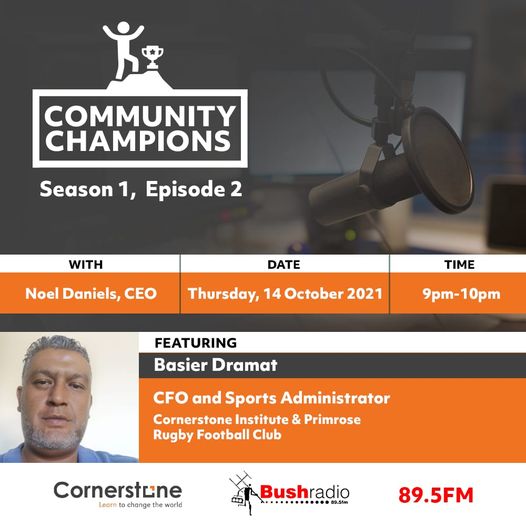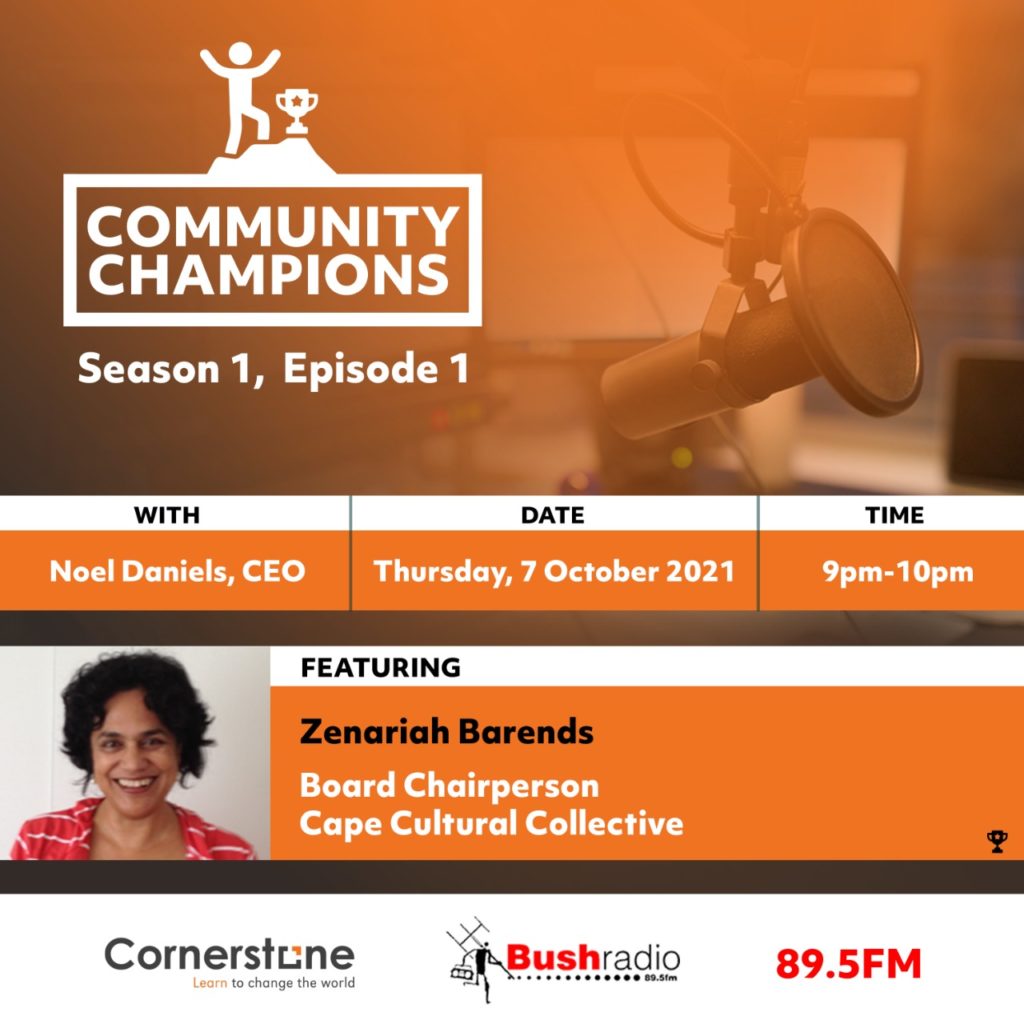Cornerstone Institute is a private institute of higher learning, offering a range of courses relevant to helping us to confront South Africa’s biggest social, political and economic challenges. Community Champions is a new and exciting initiative created by Cornerstone Institute and Bush Radio to bring to light those ‘behind the scenes people that make a difference in our community. Noel’s interviewees talk about themselves and how they work to help others.
Kicking off at 9 pm starting every Thursday on Bush Radio 89.5FM. Noel will take us on a journey, exploring the world of leaders of non-profit organisations, social entrepreneurs, groundbreakers, doers who are making a difference in their communities through community forums, artists, go-getters, small business people, activists and others, all who have one thing in common – they are women and men who pay it forward.
The guests on the Community Champions program are people who care about the community, and who through their work and how they have lived, and continue to live their lives, make significant contributions to empowering others. Cornerstone Institute and Noel Daniels are no strangers to engaging community developers, having hosted more than 100 influential guests over the past six years through their well-known Critical Dialogue series.
In fact, the 9 pm CEO Chats with Community Champions show immediately follows the Cornerstone Critical Dialogues Learn to Change the World Conversations (the new format for the Critical Dialogues), which are broadcast in the 7 – 9 pm slot on Bush Radio, live-streamed on Cornerstone’s Facebook page and YouTube channel and as a podcast on Spotify and iTunes.
So please tune in to Bush Radio at 9 pm every Thursday for new episodes of the CEO Chats, where Cornerstone Institute CEO Noel Daniels will take us on a journey into the lives, struggles and victories of South Africa’s best community champions.
In the season finale of Community Champions on Bush Radio 89.5 FM, Cornerstone Institute CEO Noel Daniels will interview human rights lawyer, activist and Cornerstone Institute board member Gary Jansen.


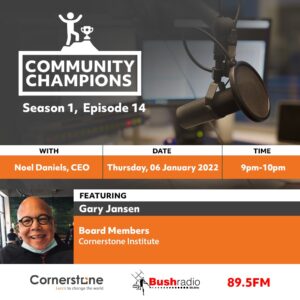 Gary Jansen has practised law since 1984. He was articled to Y. Ebrahim and Co., where he established himself as a human rights lawyer, working to assist communities with a range of political issues.
Gary Jansen has practised law since 1984. He was articled to Y. Ebrahim and Co., where he established himself as a human rights lawyer, working to assist communities with a range of political issues.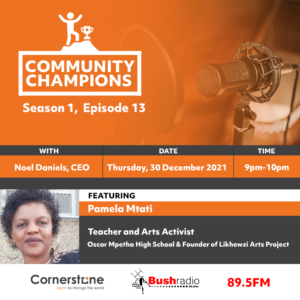 Pamela Mtati was born in Gugulethu, Cape Town. As a child, she was interested in everything; her curiosity led her to ballroom dancing, which she did for 10 years, excelling in local competitions.
Pamela Mtati was born in Gugulethu, Cape Town. As a child, she was interested in everything; her curiosity led her to ballroom dancing, which she did for 10 years, excelling in local competitions.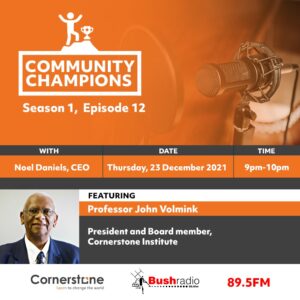 Dr John Volmink was born and raised in the suburb of Athlone, Cape Town. He started his academic career at the University of the Western Cape where he completed a BSc in Mathematics, Applied Mathematics and Physics and a BSc (Hons) in Physics.
Dr John Volmink was born and raised in the suburb of Athlone, Cape Town. He started his academic career at the University of the Western Cape where he completed a BSc in Mathematics, Applied Mathematics and Physics and a BSc (Hons) in Physics. 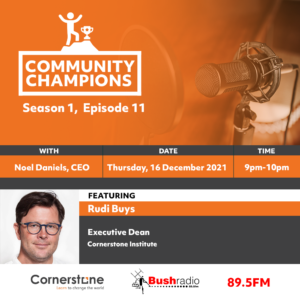 Rev Dr Rudi Buys joined Cornerstone Institute as Dean of Humanities in 2017, and now serves as Executive Dean responsible for all faculties and programmes.
Rev Dr Rudi Buys joined Cornerstone Institute as Dean of Humanities in 2017, and now serves as Executive Dean responsible for all faculties and programmes.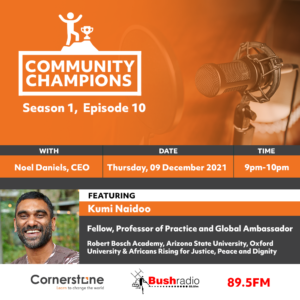 Kumi Naidoo is a South African-born human rights and climate activist.
Kumi Naidoo is a South African-born human rights and climate activist.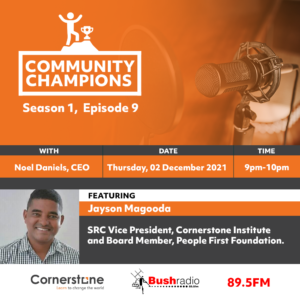 Jayson Magooda is from Bishop Lavis in Cape Town. He is a musician and community development worker who started working with young people as early as 1998.
Jayson Magooda is from Bishop Lavis in Cape Town. He is a musician and community development worker who started working with young people as early as 1998.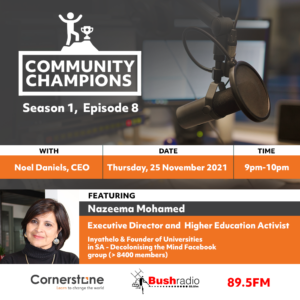 Nazeema Mohamed’s academic life, professional trajectory and political activism have all focused on resisting inequality and achieving social justice. Her work is built on a values and ethics foundation, which is respectful of human dignity and affirms our humanity.
Nazeema Mohamed’s academic life, professional trajectory and political activism have all focused on resisting inequality and achieving social justice. Her work is built on a values and ethics foundation, which is respectful of human dignity and affirms our humanity.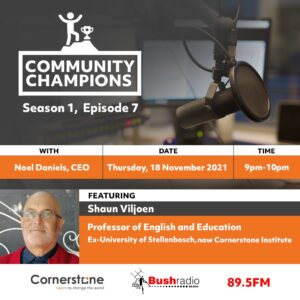 Shaun Viljoen was born in June 1956, in Athlone, Cape Town, into a working-class family that was engaged in organisations striving for non-racialism during Apartheid.
Shaun Viljoen was born in June 1956, in Athlone, Cape Town, into a working-class family that was engaged in organisations striving for non-racialism during Apartheid.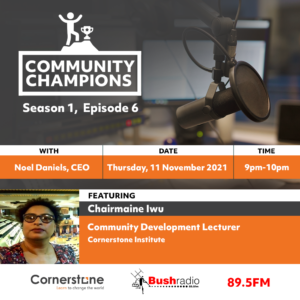 Charmaine Iwu is a Community Development Lecturer at Cornerstone Institute. She holds a Bachelor of Administration Honours from the University of the Western Cape, as well as a Masters of Education from the Cape Peninsula University of Technology.
Charmaine Iwu is a Community Development Lecturer at Cornerstone Institute. She holds a Bachelor of Administration Honours from the University of the Western Cape, as well as a Masters of Education from the Cape Peninsula University of Technology.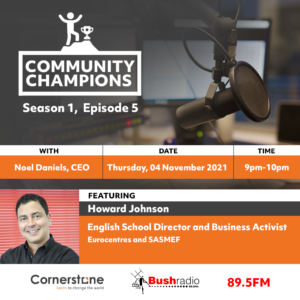 Howard Johnson is an entrepreneur whose ambition is to establish and sustain businesses that contribute to people’s economic growth and development.
Howard Johnson is an entrepreneur whose ambition is to establish and sustain businesses that contribute to people’s economic growth and development.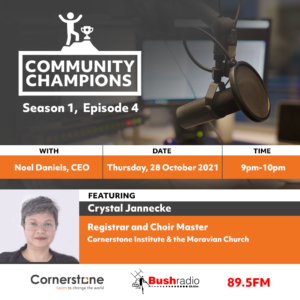 Biography
Biography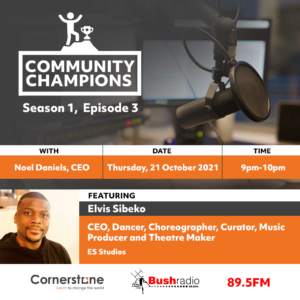 Elvis Sibeko is a CEO, internationally acclaimed theatre director, choreographer, dancer, fitness instructor and festival curator.
Elvis Sibeko is a CEO, internationally acclaimed theatre director, choreographer, dancer, fitness instructor and festival curator.